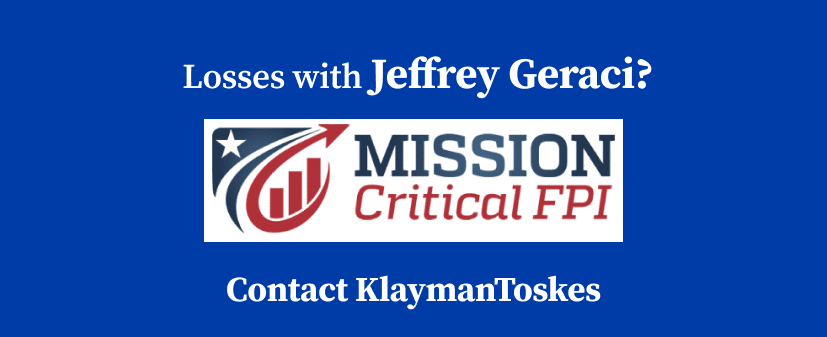
National investment loss lawyers KlaymanToskes is investigating Jeffrey Stephen Geraci (CRD# 1839469) of Intervest International, doing business as Mission Critical FPI, following the filing of two customer complaints and one regulatory disclosure against the Virgina Beach, VA-based broker/investment advisor.
Investors that suffered losses with Jeff Geraci of Mission Critical FPI may have recovery options. Contact attorney Lawrence L. Klayman at (888) 997-9956 or lklayman@klaymantoskes.com for a free consultation to discuss your legal options. We do not collect attorney’s fees unless we are able to obtain a financial recovery for you.
According to FINRA BrokerCheck, Jeff Geraci has three public disclosures including two settled customer complaints and one regulatory action initiated by FINRA.
One of Geraci’s customer complaints alleged that he failed to comply with the customer’s instructions in an inherited account, from a broker who previously resigned from his firm. The complaint was settled in favor of the investor for $110,000.
Geraci’s additional customer complaint alleged the unsuitable sale of a convertible note to a non-accredited investor. The complaint was settled in favor of the customer for $9,100.
Related to the latter complaint, Jeffery S. Geraci entered into a FINRA regulatory action known as a Letter of Acceptance, Waiver, and Consent, which ordered him to pay restitution of $50,000 and suspended him for two business days.
According to the AWC “The Hearing Panel concludes that because of the high degree of risk inherent in the investment, Geraci’s recommendation was unsuitable for the customer, based upon her investment objectives, risk profile, and financial circumstances”.
A convertible note is a type of debt instrument commonly used in startup financing. It is generally a short or medium-term loan provided by an investor to a startup company in exchange for a promissory note. A unique feature of convertible notes is their ability to convert into equity in the future, typically upon the occurrence of certain specified events, such as a future financing round or a liquidity event.
Brokerage firms and their financial professionals must thoroughly evaluate the conditions of convertible notes, consider their customers’ risk tolerance, and conduct reasonable due diligence before making investment recommendations.
The risks associated with convertible notes may vary depending on the specific terms and the financial health of the issuing company. In KlaymanToskes experience, the following is a list of potential problems or risks associated with convertible notes for investors:
Illiquidity Risk: Illiquidity poses a significant risk for investors in convertible notes, particularly when there is an absence of a secondary market for trading them. The limited liquidity associated with such circumstances can have profound consequences, making it difficult to sell the notes and realize the investment, potentially causing investors delays or complications in accessing funds.
Default Risk: There is a risk that the issuing company may default on the repayment of the principal and interest amount specified in the convertible note. The investor may not receive the full repayment if the company faces financial difficulties or goes bankrupt.
Subordination Risk: In some cases, convertible notes may be subordinated to other debt obligations of the company. This means that in the event of bankruptcy or liquidation, the investor’s claim on assets may be lower compared to other debt holders.
Equity Dilution Risk: When a convertible note converts into equity, it can lead to dilution of existing shareholders’ ownership. The investor’s ownership percentage in the company may decrease as more shares are issued.
Call Risk: Some convertible bonds may have a call provision, allowing the issuer to redeem before maturity. If the bond is called, investors may not have the opportunity to benefit from future potential price appreciation.
Conversion Terms Risk: The conversion terms for convertible notes may not always be favorable to the investor. Factors such as the conversion price, conversion discount, or valuation cap can affect the number of shares received upon conversion and the potential upside for the investor.
If you suffered losses due to unsuitable investment advice, contact attorney Lawrence L. Klayman at (888) 997-9956 or lklayman@klaymantoskes.com for a free consultation to discuss your legal options. We do not collect attorney’s fees unless we are able to obtain a financial recovery for you.
KlaymanToskes is a leading national securities law firm which practices exclusively in the field of securities arbitration on behalf of retail and institutional investors throughout the world in large and complex securities matters. The firm has recovered over $250 million in FINRA arbitrations and over $350 million in other securities litigation matters. KlaymanToskes has office locations in California, Florida, New York, and Puerto Rico.
KlaymanToskes, P.A.
Lawrence L. Klayman, Esq.
888-997-9956
lklayman@klaymantoskes.com
www.klaymantoskes.com